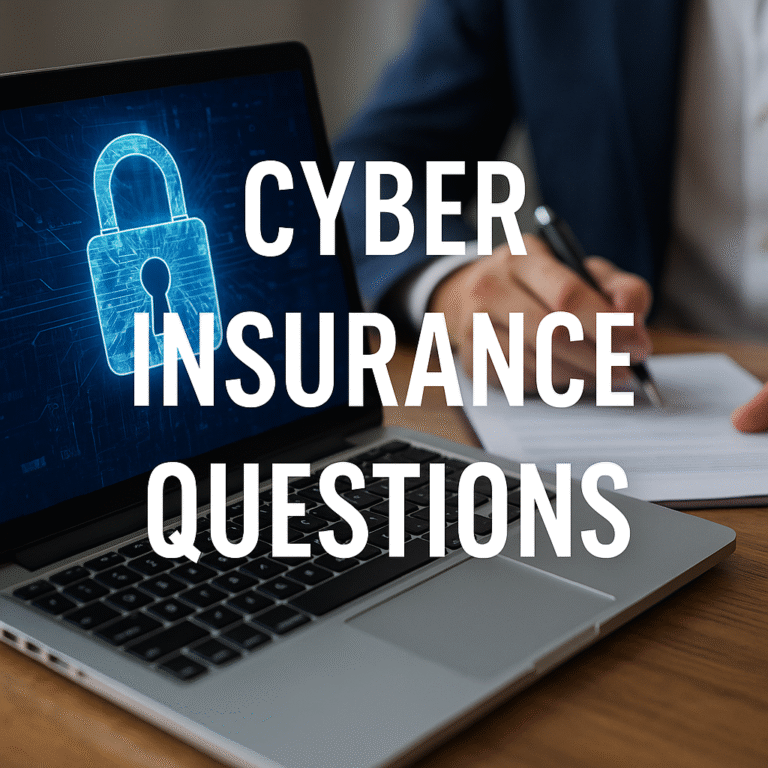Cyber attacks are growing, and businesses face more risk than ever. Whether you’re a startup, a healthcare provider, or an e-commerce store, protecting your digital assets is non-negotiable. That’s where cyber insurance steps in. It gives your business peace of mind, financial safety, and a reliable path to recovery. In this guide, we’ll cover the most important cyber insurance questions with trusted advice, expert insight, and real value.
What Is Cyber Insurance? [Definition + Importance]
Cyber insurance is a type of business insurance that protects you from internet-based risks. It covers losses from data breaches, ransomware attacks, and other digital threats. As cybercrime grows in cost and complexity, cyber insurance is no longer optional—it’s essential.
Why Businesses Need Cyber Insurance in 2025
Cyber attacks are now smarter, faster, and more damaging. In 2025, businesses face threats like AI-powered phishing, supply chain breaches, and data extortion. Cyber insurance ensures you can recover quickly and keep your business running, even after a major cyber event.
What Does Cyber Insurance Cover?
Cyber insurance can protect you in many ways. The most common coverage includes:
Data Breach Response
Pays for notification costs, credit monitoring, and legal defense.
Ransomware and Extortion
Covers ransom payments, response teams, and forensic analysis.
Business Interruption
Compensates for lost income if your systems go down.
Legal Fees and Penalties
Helps with legal advice, lawsuits, and regulatory fines.
Third-Party Liability
Covers damages caused to clients or partners due to your data breach.
What’s Not Covered by Cyber Insurance?
Every policy has exclusions. Knowing them helps avoid surprises.
Poor Cyber Hygiene
If you don’t follow basic security practices, you may not be covered.
Insider Threats
Intentional acts by employees are often excluded.
Pre-existing Incidents
Anything that occurred before the policy started won’t be covered.
Infrastructure Failures
Breakdowns of public utilities or third-party services may not qualify.
Top Questions to Ask Before Buying Cyber Insurance
Before signing a policy, ask these key questions:
What is the claims process like?
Speed matters. Know how quickly your provider responds.
Are third-party vendors covered?
Outsourced IT and software partners can be weak links.
What is the deductible?
Make sure the deductible fits your risk tolerance.
Is social engineering fraud included?
Some policies don’t cover fraud from phishing or impersonation.
How Much Does Cyber Insurance Cost?
Cyber insurance pricing varies. Key factors include:
- Industry (healthcare and finance pay more)
- Business size and revenue
- History of past incidents
- Level of cybersecurity in place
Small businesses might pay $500 to $2,000 annually. Larger firms can pay tens of thousands. Strong security can lower premiums.
Cyber Insurance Requirements for Businesses
Insurers expect you to meet certain security standards. These often include:
Multi-Factor Authentication (MFA)
Protects accounts with extra login layers.
Regular Backups
Ensure data is safe even if ransomware hits.
Endpoint Protection
Antivirus and monitoring tools protect workstations.
Employee Training
People are the first line of defense against phishing.
How to Choose the Right Cyber Insurance Provider
Look beyond just the price. A great insurer should offer:
Experience in Cyber Risk
Choose providers with proven success in managing cyber claims.
Customizable Coverage
Your risks are unique. One-size-fits-all won’t cut it.
Strong Claims Support
Ask for real response time metrics.
Transparent Terms
Avoid confusing jargon and hidden exclusions.
Cyber Insurance vs. General Liability Insurance
General liability won’t protect against data loss or ransomware. Cyber insurance fills this gap. It’s designed for modern threats that traditional policies ignore.
The Future of Cyber Insurance: Trends & Predictions
Expect smarter, faster, more AI-powered underwriting. Insurers are using data analytics to personalize policies and reduce fraud. Also, regulatory requirements will continue to grow, making cyber insurance more relevant than ever.
In related trends, people are also wondering why is honda civic insurance so high, which ties into how insurers assess risk based on behavior, data history, and market patterns. Understanding these models helps both car and cyber insurance buyers make smarter choices.
Conclusion
Cyber insurance is a powerful safety net. It’s your shield against the digital unknown. As cyber threats evolve, staying protected means asking the right questions, choosing the right partners, and investing in peace of mind. Whether you run a tech firm or a retail store, cyber coverage helps you bounce back better, faster, and stronger.
While on the topic of coverage, many also ask does walmart offer car insurance. It’s another sign that people want comprehensive protection in all areas of life. Your digital assets deserve no less.
FAQs About Cyber Insurance Questions
What is cyber insurance and why is it important?
Cyber insurance is a financial safety net that protects businesses from digital threats like hacking, ransomware, and data breaches. It helps cover costs related to recovery, legal fees, and loss of income. In today’s digital world, it’s critical for business continuity and trust.
Does cyber insurance cover ransomware attacks?
Yes, most cyber insurance policies include ransomware coverage. This can include ransom payments, forensic analysis, crisis communication, and system restoration. Always check if your policy limits or excludes certain ransomware-related costs.
How much does cyber insurance cost for a small business?
Small businesses typically pay between $500 and $2,000 per year. The price depends on your industry, size, past incidents, and security posture. Cyber insurance becomes more affordable with good digital hygiene and staff training.
What should I look for in a cyber insurance policy?
Look for broad coverage, clear terms, responsive claims support, and flexible deductibles. Policies should include coverage for legal defense, data recovery, business interruption, and third-party liabilities.
Is cyber insurance mandatory for businesses?
It’s not legally required in most places, but some industries and contracts may demand it. For example, vendors working with healthcare or finance clients may need coverage. Even when not required, it’s highly recommended for financial safety and trust.
